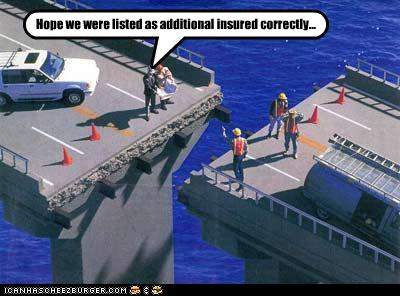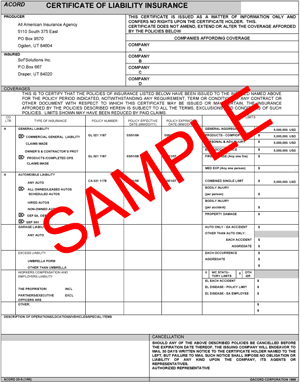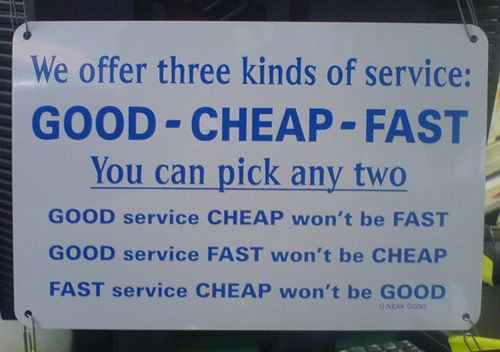Posted by Dan Phelan on Tue, Feb 01, 2011 @ 08:28 AM
 Most contractors don't have major property insurance concerns for their own building. Usually it's extremely large or ornate, because most of the time their employees are out in the field. Building, repairing, servicing, grading, driving, digging, and climbing; rather than working from the office. In my time in the insurance industry, I don't think I've ever said to a client or prospect "What would happen to your company if your roof collapsed tomorrow?" Most of the time, the line of questioning goes something like:
Most contractors don't have major property insurance concerns for their own building. Usually it's extremely large or ornate, because most of the time their employees are out in the field. Building, repairing, servicing, grading, driving, digging, and climbing; rather than working from the office. In my time in the insurance industry, I don't think I've ever said to a client or prospect "What would happen to your company if your roof collapsed tomorrow?" Most of the time, the line of questioning goes something like:
"What would happen to your company if you had a hostile fire that burnt your building to the ground?"
More often than not, the response is something like:
"Total loss is impossible, the building is brick."
"Not a concern, we have an up to code sprinkler system."
More often than not, it doesn't seem worthwhile to push back on either of these objections because historically, these types of losses are extremely rare. This winter in Connecticut, things are a little different. I've lived in Connecticut for most of my life, and can't remember when the potential for roof collapse from snow load has been greater. (I wasn't born yet when the Civic Center's roof collapsed) There have already been established businesses and recently built homes that have already had collapses. The governor has already advised residents and business owners to clear snow from their roofs prior to the winter storm event that is underway as I type this post.
So, what if the roof on your construction company collapsed tomorrow because another two feet of snow fell on it?
Do you have your plans, drawings, blueprints, invoices, change orders, etc backed up somewhere off-site?
Do you have your computers and building contents insured to value?
How long would it take to get a roofing contractor out to rebuild your roof?
Do you have enough cashflow and a long enough backlog of work to sustain the company during this time?
Do any of your employees have the ability to work from home?
How many employees would you lose during the reconstruction?
Disaster recovery plans are often overlooked and not seriously contemplated by business owners due to the low probablity of a major disaster actual crippling their business and because they purchased business interruption insurance (the coverage with the fun worksheet). But if something did happen, wouldn't you want to be up and running as quick as possible in order to save your business and keep all of your clients from going to a competitor?
We've found Agility Recovery Solutions to be an affordable solution to these daunting questions.
As some final food for thought, what if you're a roofing contractor and you start seeing completed operations claims for roof collapses on roofs you built or serviced? Does your umbrella follow form on your GL policy? Does your GL policy have the right completed operations endorsement?
Update from the Hartford Courant
Posted by Dan Phelan on Tue, Jan 04, 2011 @ 08:00 AM
 Most general contractors worth their salt require all of their subcontractors to list them as additional insured (AI). But not all additional insured endorsements are created equal, in both coverage and time elements. Just because a sub sends you a certificate of insurance listing you(the GC) as additional insured does not mean that you are additionally insured for the types of coverage or timeframes you are requiring in your contracts. Some additional insured endorsements provide automatic coverage when a written contract is signed, some need to be separately added to their policy, some cover completed operations, some cover the owner, some cover engineers/architects...and some don't. Having the phrase "ABC Construction is listed as additional insured" on a cert can be a completely worthless statement if the sub's actual endorsement will not respond in the ways it is required to in your contract.
Most general contractors worth their salt require all of their subcontractors to list them as additional insured (AI). But not all additional insured endorsements are created equal, in both coverage and time elements. Just because a sub sends you a certificate of insurance listing you(the GC) as additional insured does not mean that you are additionally insured for the types of coverage or timeframes you are requiring in your contracts. Some additional insured endorsements provide automatic coverage when a written contract is signed, some need to be separately added to their policy, some cover completed operations, some cover the owner, some cover engineers/architects...and some don't. Having the phrase "ABC Construction is listed as additional insured" on a cert can be a completely worthless statement if the sub's actual endorsement will not respond in the ways it is required to in your contract.
This can be a problem for both the general contractor and the subcontractor. For the sub, if they don't have the proper AI endorsement as required by contract and a claim arises naming them as wholly or partially responsible, they will be both in breach of contract as well as uninsured for the claim. You, the GC, will not have access to the sub's limits because their insurance policy doesn't have the correct coverage to respond to that claim because the GC was never actually an additional insured. Long story short, they could potentially pay their portion of the claim out of pocket, and the GC will have to use their own insurance limits instead of the responsible partys'. This is a hypothetical scenario, but one that will become more prevalent as the complexity of contracts increase and lawyers become more adept at deciphering contract language.
What can you do to ensure the subs working on your jobs are in compliance with your contracts?
- Work with your insurance broker and lawyer to rewrite your standard contract with wording that reflects current language used in insurance policies
- Decide on which additional insured endorsement you will require your subs to have. Preferably one that affords coverage for ongoing AND completed operations
- REQUIRE all subs to attach a copy of their additional insured endorsement to their certificates of insurance
- Ask your agent which other AI endorsements afford equal or better coverage to the one you are requiring, because someone at your company will have to crosscheck the endorsements from subs against the endorsement you require in your contract
Will this add more paperwork for your staff? Yes and No. (unplug the fax machine and embrace technology. Computers can make this process much, much, much faster and easier)
Does this make recordkeeping more time consuming? Yes. (make a file on your computer for each job and each sub that works for you, and start mandating that all certs be emailed in PDF form)
Does this help strengthen your risk management program to guard your construction company against uninsured claims and lawsuits? YES.
And if you're a general contractor that isn't requiring your subs to list you as additional insured, please call as ASAP.
Posted by Dan Phelan on Mon, Jan 03, 2011 @ 07:21 AM
 FYI:
FYI:
You don't have to give additional insured (AI) status to every General Contractor or Owner you are working for.
In the last few years, it has become commonplace for many subcontractors to be required to afford additional insured status to the upstream parties they are contracting with. Many do this without even having it in the insurance requirements in the contract they signed! When you give another party additional insured status on your policy, you are giving them access to your insurance limits on your General Liability, Business Auto, and Umbrella policies. In our humble opinion, it's not a prudent risk managment strategy to unnecessarily give other parties access to your insurance policy if you don't have to, yet time and time again we see it happening. You only have so many insurance dollars to pay a claim each year, don't let the claims of others erode your limits to the point where you will not have coverage for a serious claim!
Let's address this issue from another angle. Not all additional insured endorsements afford the same provisions to the upstream party requiring it, and depending on which insurance carrier you have the bulk of your coverage with, will determine which type of additional insured endorsement you have on your policies. Some endorsements will expose your limits more significantly than others, especially as it pertains to completed operations. If you are working for a savvy upstream party, they are probably going to ask you for completed operations coverage, since it keeps them covered for your mistakes even after you've been paid and have left the job. Some older versions of the standard commercial general liability additional insured endorsement provide this coverage through somewhat sloppy wording and some newer versions completely exclude it.
So what happens if you signed a contract and named another party as an AI, but don't actually have completed operations coverage on your additional insured endorsement and there is a claim that your company is named as a part of a year after you were off the job? First off, you are in breach of contract because you signed off on a coverage you didn't actually have. Secondly, your insurance carrier has no obligation to pay a claim that your policy was not built to respond to. This doesn't mean that you are off the hook and free to bid your next project. This means that your construction company is on the hook for whatever portion of that claim has been apportioned to you. This also means you'll be needing an expensive lawyer and will be getting your company checkbook out to clear this up.
How to fix this and make sure you're in compliance with all the contracts you're signing? Find an insurance broker that understands the complexities of construction insurance, knows how to read a construction contract, and can advise you on what type of additional insured endorsement is best for your company. To reiterate, just because you named another party as AI on your certificate of insurance, does not mean that you are in compliance with the contract you signed.
Things to check on your policy ASAP:
- The additional insured endorsement on your policy grants "blanked additional insured status when required by written contract"
- If the contracts you sign are requiring "completed operations", make sure your endorsement has this provision built into it
- If a contract mentions a specific AI endorsement, double check with your broker that your endorsement carries at least the equivalent amount of coverage as the one in the contract.
Posted by Dan Phelan on Wed, Sep 29, 2010 @ 07:52 AM
 Insurance is expensive. Whether Geico saves you 15% or you had a few losses last year and your premium was increased 15%, you're probably still thinking that insurance is too expensive. The perception of many commercial construction insurance buyers is that if they "shop around" their insurance, they will be able to find a cheaper rate. While this CAN be a way to achieve your goal of getting cheaper insurance, let's look at a few of the pitfalls of this mindset. For this example, let's say ABC contractor is a carpenter that has been working as a sole proprietor and up to this point has only carried Commerical General Liability. However, he just got the opportunity to bid on a $50,000 job and the upstream party(owner or General Contractor) is requiring that he carry workers compensation. This insurance coverage hasn't been necessary for any jobs he has done in the past, and whenever he needed assistance on a job, he just called up one of his buddies and paid them under the table for their services. Yes, we in the insurance industry are well aware of this practice, and have a general understanding of what type of labor is necessary to complete certain aspects of a construction project. Anyways, so now you know you are going to have to carry workers compensation, as well as legally pay your helper/employee. Because you're inundated by PERSONAL insurance marketing whenever you turn on your TV, your gut reaction is to pick up the phone or hop on the internet to get as many quotes as you can without ever considering whether the insurance agents and brokers you are calling know a thing about Connecticut construction insurance. So now you've got a few live insurance people in the phone and are getting multiple quotes from different agents for different lines of coverage.
Insurance is expensive. Whether Geico saves you 15% or you had a few losses last year and your premium was increased 15%, you're probably still thinking that insurance is too expensive. The perception of many commercial construction insurance buyers is that if they "shop around" their insurance, they will be able to find a cheaper rate. While this CAN be a way to achieve your goal of getting cheaper insurance, let's look at a few of the pitfalls of this mindset. For this example, let's say ABC contractor is a carpenter that has been working as a sole proprietor and up to this point has only carried Commerical General Liability. However, he just got the opportunity to bid on a $50,000 job and the upstream party(owner or General Contractor) is requiring that he carry workers compensation. This insurance coverage hasn't been necessary for any jobs he has done in the past, and whenever he needed assistance on a job, he just called up one of his buddies and paid them under the table for their services. Yes, we in the insurance industry are well aware of this practice, and have a general understanding of what type of labor is necessary to complete certain aspects of a construction project. Anyways, so now you know you are going to have to carry workers compensation, as well as legally pay your helper/employee. Because you're inundated by PERSONAL insurance marketing whenever you turn on your TV, your gut reaction is to pick up the phone or hop on the internet to get as many quotes as you can without ever considering whether the insurance agents and brokers you are calling know a thing about Connecticut construction insurance. So now you've got a few live insurance people in the phone and are getting multiple quotes from different agents for different lines of coverage.
What happens when you need a certificate of insurance?
1. You call BOTH of your agents (because they were able to get cheap quotes, but not for both GL and Comp)
2. Both of these agents either fax, email, or snail mail the certificate to the certificate holder (now the receiving party has to coordinate the filing of multiple certs, arriving at different times. AKA a pain in the ass for the owner/GC you're working for and is PAYING you)
3. Did you read your contract? Does it require you to maintain your General Liability coverage for several years after the completion of the project. (Hint: most commercial construction contracts have this requirement) Now, for 3-7 years following the completion of this job you will be required to send certs to the certificate holder for the next few years at the time your insurance renews. Multiple agents, sending multiple certificates for multiple years is a poor risk management strategy. If you don't send these certificates, and have a complete operations claim, you will be in breach on contract and whichever insurance carrier issued your policy, is no longer required to pay your claim.
This is a reality. This kind of claim happens often. Will it be worth paying 20 grand out of YOUR pocket to save $80 dollars on your insurance policy?
If that 80$ is more important that keeping your doors open, please use the yellow pages to find coverage. If you want a policy that covers your construction company correctly and makes it easy for General Contractors and Owners to work with you, Call Us.